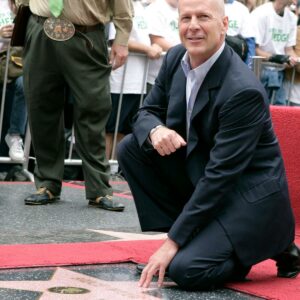Introduction
In an era where diversity in film is more than just a trending topic—it has become an essential component of storytelling—Bruce Willis, a Hollywood icon known for his roles in action-packed blockbusters like Die Hard and The Fifth Element, has emerged as a vocal advocate for inclusivity. Over his expansive career, Willis has witnessed firsthand the evolving landscape of Hollywood, and his growing awareness of the importance of diversity reflects not just his understanding of the changing industry but also his desire for a film world that mirrors the complexities and richness of real life.
Willis’s advocacy goes beyond mere words. His career choices, his public statements, and his support of emerging talents demonstrate his commitment to fostering a more inclusive Hollywood. As discussions about diversity continue to shape the entertainment industry, Willis’s perspective offers a critical lens through which we can understand the importance of authentic representation and the future of film.
Early Career and Realizations
Bruce Willis began his career during a period in Hollywood where diversity was often overlooked, both in front of and behind the camera. The 1980s and early 1990s were a time when the industry was predominantly white, and stories centered around white protagonists dominated the box office. Willis, who became a household name with the success of Die Hard in 1988, was part of this mainstream. However, as his career progressed and the world around him changed, Willis began to reflect on the lack of diversity in the films he had been a part of.
In various interviews, Willis has acknowledged that his early films often lacked representation and were narrowly focused on white, male experiences. He has been candid about his realization that this was a problem not just in his work but across the industry. Willis has spoken about the responsibility of film as a medium to reflect the diverse world we live in and the need for Hollywood to evolve in this regard. His journey from a rising star in an industry that often marginalized minority voices to an advocate for inclusivity showcases his personal growth and the broader shift within Hollywood.
Willis recognizes that diversity isn’t just about putting different faces on screen—it’s about telling stories from a variety of perspectives, making space for voices that have been historically underrepresented, and ensuring that these stories are told with authenticity and respect. This realization has informed his work in recent years and his efforts to push for change within the industry.
A Call for Authenticity
One of the key points Willis emphasizes when discussing diversity in Hollywood is the importance of authenticity. For him, diversity in film isn’t about meeting quotas or ticking boxes. It’s about telling real, relatable stories that resonate with audiences across cultures, races, and backgrounds. Willis has argued that when filmmakers commit to authenticity, they create films that are not only more engaging but also more meaningful. Audiences want to see themselves reflected in the characters and narratives on screen, and authentic representation allows for a deeper connection with the film.
Willis believes that authenticity in storytelling involves not only casting actors from diverse backgrounds but also ensuring that the stories being told are grounded in the realities of those experiences. This means hiring writers, directors, and producers who understand the nuances of the cultures and communities being portrayed. Authenticity in storytelling leads to richer, more compelling narratives that resonate with audiences on a deeper level.
In his discussions about diversity, Willis often draws on his own experiences as an actor. He has spoken about the importance of connecting with a character on a personal level and how this connection is made stronger when the character’s story is authentic and true to life. Whether he’s playing an action hero, a detective, or a father, Willis understands that his characters need to feel real to the audience. This is why he champions the idea of authenticity in diversity—it’s not just about representation, but about creating characters and stories that audiences can relate to and believe in.
Supporting Emerging Talent
Beyond his on-screen roles, Bruce Willis has been a vocal supporter of emerging talent, particularly from diverse backgrounds. He understands that fostering diversity in Hollywood isn’t just about casting more actors of color or telling more diverse stories—it’s about creating opportunities for a new generation of filmmakers and actors who might not have had access to the industry in the past.
Willis has used his platform to mentor and support up-and-coming talent, recognizing that the future of Hollywood depends on the success of these new voices. In interviews, he has mentioned the importance of offering opportunities to filmmakers from underrepresented communities, whether that’s by producing their projects, helping them navigate the industry, or simply providing advice and guidance. For Willis, supporting emerging talent is a crucial part of ensuring that Hollywood continues to evolve and become more inclusive.
One of the ways Willis has demonstrated his commitment to supporting new voices is through his involvement in independent films. While he is best known for his work in big-budget blockbusters, Willis has also taken on roles in smaller, independent films that often provide more opportunities for diverse talent. By lending his star power to these projects, Willis helps bring attention to films that might otherwise go unnoticed and supports the careers of emerging filmmakers.
In addition to his work on screen, Willis has also been involved in producing and developing projects that showcase diverse voices. He understands that change in Hollywood needs to happen at all levels of production, from the writing and directing to the marketing and distribution of films. By supporting diverse talent behind the camera, Willis helps ensure that the stories being told on screen are authentic and reflective of the world we live in.
Diversity in Genre
One of the most interesting aspects of Bruce Willis’s advocacy for diversity is his emphasis on the importance of representation across all film genres. While discussions about diversity often focus on drama and independent films, Willis has pointed out that diversity should be present in every genre, from action and comedy to science fiction and horror. As an actor primarily known for his work in action films, Willis understands the impact that diverse representation can have in genres that are often dominated by white, male protagonists.
Willis has argued that diverse characters and stories enrich all genres, making them more exciting and reflective of the world audiences live in. He has spoken about the need for more representation in action films, where characters from diverse backgrounds can bring new perspectives and ideas to familiar tropes. In his view, diversity isn’t just about expanding the types of stories being told—it’s about making every genre more dynamic and interesting by including a wider range of voices.
In science fiction, for example, Willis has highlighted the importance of diverse casting and storytelling in a genre that often explores futuristic and speculative worlds. Science fiction has the potential to imagine new possibilities for society, and Willis believes that these possibilities should include a more inclusive vision of the future. By casting actors from diverse backgrounds and telling stories that reflect the experiences of people from different cultures, science fiction can become a genre that not only entertains but also challenges audiences to think about the world in new ways.
Similarly, in comedy, Willis has emphasized the importance of diverse representation to ensure that humor resonates with a broad audience. Comedy is often based on cultural references and shared experiences, and by including a wider range of perspectives, filmmakers can create comedies that are more relatable and engaging for diverse audiences.
The Impact of Willis’s Advocacy
Bruce Willis’s advocacy for diversity in Hollywood has had a tangible impact on the industry. His willingness to speak out on these issues, combined with his efforts to support emerging talent and promote authenticity in storytelling, has helped push Hollywood towards a more inclusive future.
Willis’s influence is particularly significant because of his stature in the industry. As one of Hollywood’s biggest stars, his words carry weight, and his actions set an example for others in the industry. By using his platform to advocate for change, Willis has helped bring attention to the importance of diversity in film and has encouraged others to do the same.
In recent years, Hollywood has made strides towards greater diversity, but there is still much work to be done. Willis’s continued advocacy serves as a reminder that diversity is not just an ideal to strive for—it’s an essential element of storytelling that enriches the entire cinematic experience. As Hollywood continues to evolve, the importance of voices like Willis’s cannot be overstated.
Conclusion
Bruce Willis’s advocacy for diversity in film is a testament to his understanding of the power of cinema. His call for inclusivity, authenticity, and the nurturing of new talent continues to resonate in an industry still striving for equality. Willis’s emphasis on the importance of diversity across all genres, from action to science fiction to comedy, highlights the need for representation in every aspect of filmmaking.
As the film world continues to evolve, Willis’s words and actions serve as a reminder that diversity is not just about adding more faces to the screen—it’s about telling real, authentic stories that reflect the complexities of the world we live in. By supporting emerging talent, promoting authenticity in storytelling, and advocating for greater diversity in all genres, Bruce Willis is helping to shape the future of Hollywood. His efforts remind us that diversity is not just a buzzword—it’s a crucial component of storytelling that has the power to enrich our lives and change the world.
In a time when Hollywood is more aware than ever of the need for inclusivity, Bruce Willis stands as a vocal advocate, pushing for a film world that truly reflects the diverse, multifaceted reality of our society. Through his words, his work, and his support of emerging talent, Willis is helping to ensure that Hollywood continues to move towards a more inclusive and representative future.





